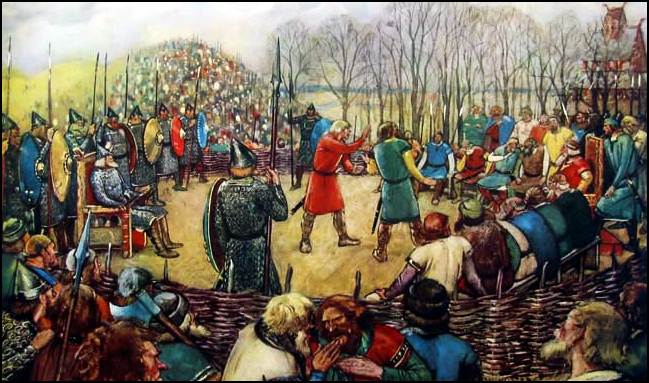Grith: A Matter of Necessity
A discussion of grith almost always follows one regarding frith, and it’s easy to understand why: the two are related notions, one concerning the interactions with one’s inner-yard, the other with one’s outer-yard. Yet their definitions aren’t easily pegged. As our previous article on frith notes, it’s most often translated as “peace.” Yet that definition is more suited to grith. Frith is more of a “harmony” in the metaphorical sense. Harmony with one’s kith and kin. Grith, however is more a matter of diplomacy. One is passive, constantly present. The other is active, invoked only when necessary.
And that invocation can’t be by any random person. It’s only those who are in positions of authority that can invoke grith. A chieftain, priest, or priestess certainly. But in modern times, there are situations wherein someone who is not normally a person of tribal authority can invoke grith. Most often these are gatherings of various groups of Heathens who are typically not involved with one another. Regional events, or smaller, citywide events, can fall into this category. Even events that are not entirely Heathen in nature may, officially or unofficially, be governed by the rule of grith. And by unofficially, that is to say that whatever authority is present for that gathering has formally implemented rules of behavior similar to grith.
When invoked, grith essentially means that those present must act in a diplomatic manner, regardless of previous interactions or existing animosity. In modern terms, this means you stow whatever issues you have with someone else until you’re outside the bounds of grith. This most frequently comes into play during regional Heathen gatherings, where multiple groups, families, and Kindreds may attend. Many of these groups may have wildly different ideas as to what is “proper” Heathen practice, and while arguments may arise, they must stay within the realm of grith; the peace must be kept. In fact, even if a physical altercation occurs, grith demands that it happen within tightly-held rules, and that afterward those involved interact peacefully and accept the outcome.
Aside from the requirement for diplomacy, the individual invoking grith can add other rules regarding behavior while grith is active. However, grith can never be used to force any kind of active behavior or obligation. Grith cannot be used to, for instance, require one tribe to come to the defense of another. Nor is it ongoing; once the situation in which it is called ends, grith ends. There are very few settings in which grith lasts beyond a set time. Hofs or temples, for instance, might be under a lasting grith, and might act as a kind of sanctuary. And in modern times, terms like “e-grith” have popped up to describe the rules of online forums and groups, in which a peace is required to be kept, and certain rules are mandated. Unlike situations of grith that are in-person, e-grith has no real lasting sanctions for those that break it, save perhaps removal from whatever group has invoked it.
To sum up, frith stands between you and your innangarth, your inner-yard, and is an ongoing situation of harmony between you and your kin. Grith is almost always temporary, a sort of cease-fire that is invoked by someone who stands as an authority for whatever group is hosting an event or holds sway over a particular place. It is even more necessary today to understand grith and what it entails, with so many disparate groups that are attempting to build on the foundations of the past and may have differing ideas as to what those foundations entail. We must remember, however, that grith doesn’t have any sway over day-to-day interactions. If you find yourself in disagreement with someone, even another Heathen, there is no mandate for courtesy; you may decide for yourself whether they deserve that courtesy, but no one can just invoke grith unless you’ve agreed to their authority to do so. Of course, that authority can take the form of a sudden ass-kicking. One should take that into consideration when deciding whether to ignore another’s claim of grith.
